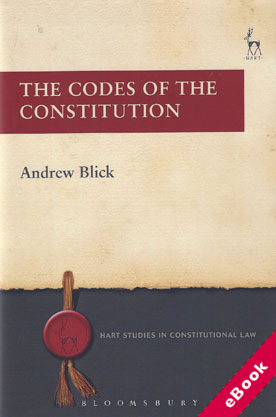
The device(s) you use to access the eBook content must be authorized with an Adobe ID before you download the product otherwise it will fail to register correctly.
For further information see https://www.wildy.com/ebook-formats
Once the order is confirmed an automated e-mail will be sent to you to allow you to download the eBook.
All eBooks are supplied firm sale and cannot be returned. If you believe there is a fault with your eBook then contact us on ebooks@wildy.com and we will help in resolving the issue. This does not affect your statutory rights.
This book considers the growing tendency for the production of publicly available, official documents setting out key values and practices of the UK constitution.
The various texts considered include the Ministerial Code, the Cabinet Manual, the Civil Service Code, the Devolution Memorandum of Understanding, Core Tasks for Select Committees and the Guide to Judicial Conduct. The author discusses the historic development of this process of codification, and makes international comparisons. He considers the purpose and constitutional significance of these documents, taking into account how they are devised, and discussing the prospects for their use in judicial review.
It is noted that these codes deal in written form with issues previously handled in more amorphous fashion, or in texts not made public. Their present status is not always clear, and often they lack a statutory basis. In some instances they seek to encapsulate that which already exists; at other times to create anew.
The book then provides accounts of the content of the codes. It describes different features of the UK constitution as set out in these documents, including the Cabinet and Prime Minister, ministers and civil servants, Parliament, devolved institutions and local government and the judiciary. It considers codification specific to the coalition government formed in 2010.
The author places the provisions he identifies in their historical and constitutional context, and discusses their appropriateness and effectiveness. He asks what difference these various codes have made. The book concludes by assessing the extent to which these documents amount to a coherent whole; and considering prospects for the future. It makes proposals for improving the processes by which codes are created and implemented.